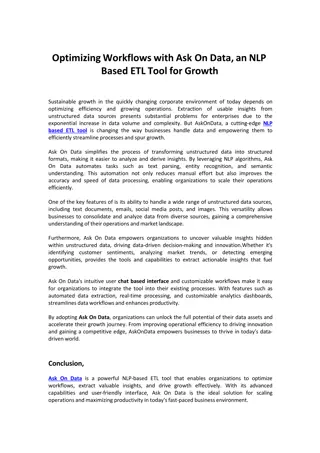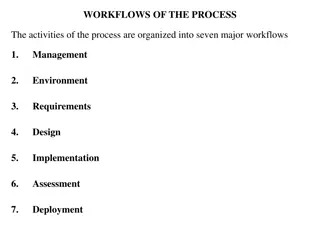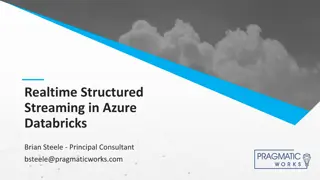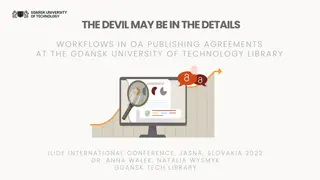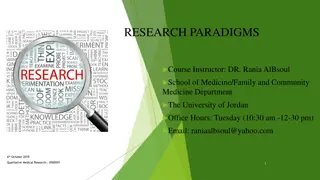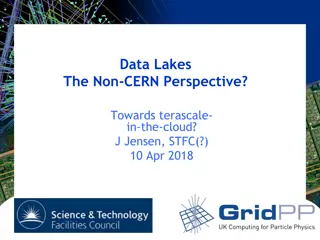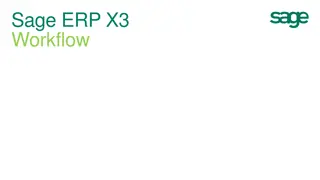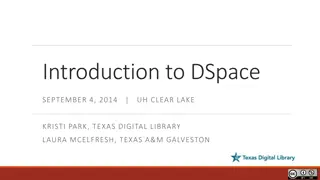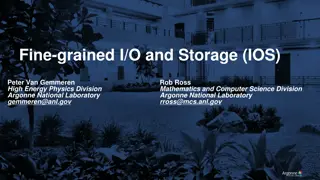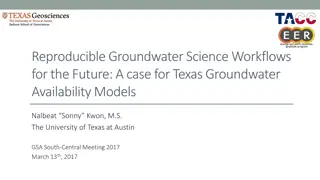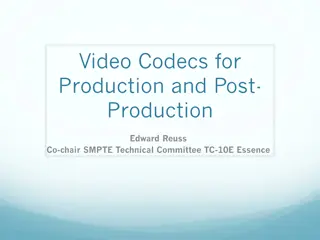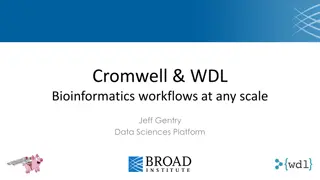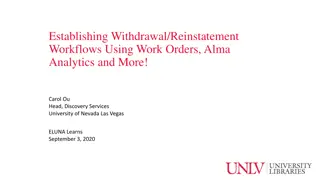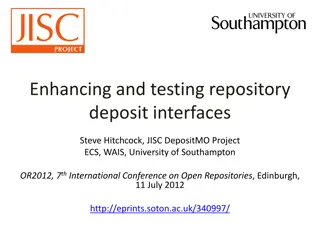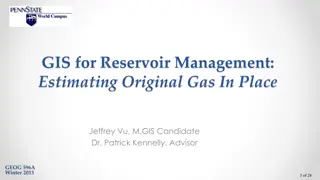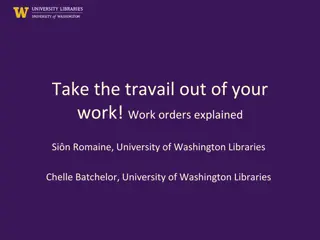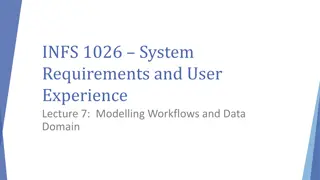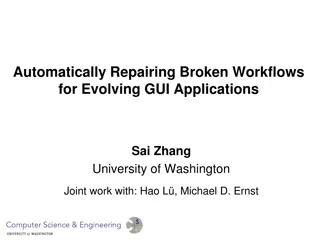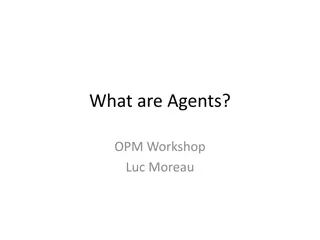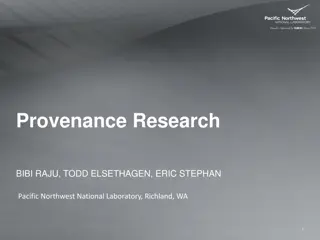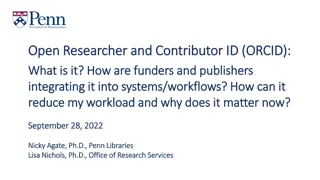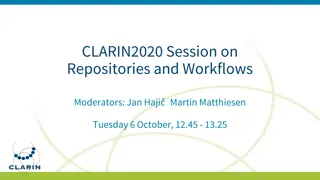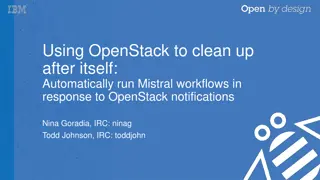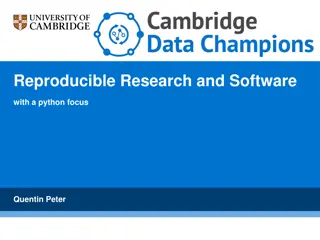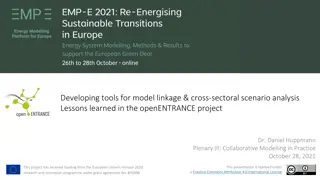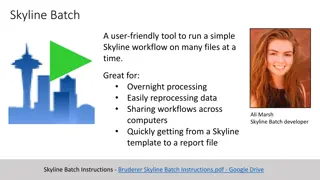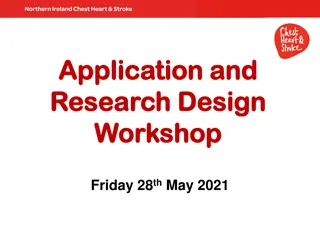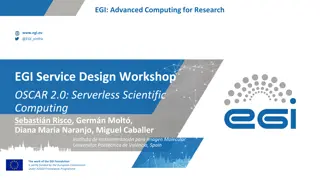Informant DBT Module under NTEP - Ni-kshay Workflows Overview
Gain insights into the Informant DBT module under NTEP - Ni-kshay workflows, including the staff and treatment supporter roles, presumptive TB registration process, and how to utilize the Ni-kshay DBT dashboard for effective patient management and notification incentives. Explore the Informant regis
0 views • 29 slides
Semi-Automatic Translation from CWL to Nextflow for Genomics Workflows
Explore the CNT tool enabling semi-automatic translation from Common Workflow Language (CWL) to Nextflow for genomics workflows. Understand the benefits, challenges, and workflow execution aspects for efficient genomics pipeline development and automation.
13 views • 45 slides
Optimizing Workflows with an NLP Based ETL Tool
Ask On Data is a powerful NLP-based ETL tool that enables organizations to optimize workflows, extract valuable insights, and drive growth effectively. With its advanced capabilities and user-friendly interface, Ask On Data is the ideal solution for scaling operations and maximizing productivity in
0 views • 1 slides
WorkHub24 Digital Transformation Success Stories in Manufacturing and Healthcare
WorkHub24's Business Process Automation led to remarkable transformations in both the manufacturing and healthcare sectors. In manufacturing, manual processes were replaced with automated workflows, resulting in significant time savings, enhanced productivity, and improved communication. In healthca
0 views • 12 slides
UCC Research Support and Strategies Overview
UCC's Research Support, Policy & Strategy function, led by David O'Connell, PhD, provides comprehensive support for research activities at the university. The office manages research funding, monitors performance, and facilitates engagement with external stakeholders. UCC's involvement in Horizon Eu
3 views • 17 slides
Software Process Workflows and Management Overview
This content discusses the organization of activities into seven major workflows in the software development process, including Management, Environment, Requirements, Design, Implementation, Assessment, and Deployment. It highlights how these workflows are performed concurrently with varying effort
1 views • 72 slides
Real-Time Data Insights with Azure Databricks
Processing high-volume data in real-time can be achieved efficiently using Azure Databricks, a powerful Apache Spark-based analytics platform integrated with Microsoft Azure. By transitioning from batch processing to structured streaming, you can gain valuable real-time insights from your data, enab
0 views • 23 slides
Effective Proposal Writing for Health Research
Learn about the fundamentals of research proposals for health-related studies, including defining research, understanding the purposes of health research, and exploring motivation for undertaking research. Discover the difference between basic and applied research, examine types of research, and del
1 views • 70 slides
Insights into Open Access Publishing Agreements at Gdansk University of Technology Library
Delve into the detailed workflows and criteria surrounding Open Access publishing agreements at the Gdansk University of Technology Library, including transformative agreements, subscription criteria assessment, open access criteria assessment, and eligibility workflows for authors and articles. Exp
0 views • 11 slides
Overview of Research Problem Identification and Formulation
Understanding the importance of defining a research problem, this content delves into the selection and formulation of research problems, the definition of a research problem, reasons for defining it, methods for identifying research problems, sources of research problems, and considerations in sele
1 views • 11 slides
Understanding Research Paradigms in Qualitative Medical Research
Delve into the world of research paradigms in qualitative medical research with a focus on the key differences between objective and subjective research, the meaning of research paradigms, components of research paradigms, types of research paradigms, and how paradigms guide the selection of researc
0 views • 42 slides
Dynamically Switching Between Synergistic Workflows for Crowdsourcing
This study explores the concept of dynamically switching between synergistic workflows for crowdsourcing, presented at AAAI-2012 in Toronto, Canada. It covers various translation techniques, human and machine involvement, NER tagging examples, and the application of crowdsourcing in determining if a
1 views • 53 slides
Guidelines for Selecting Research Project Topics in Environmental Health
Research is crucial for addressing environmental health issues. Choosing a good research topic is the first step towards effective research. This paper discusses the meaning, characteristics, types of research, and the research process to help in selecting appropriate research topics. Understanding
0 views • 15 slides
Exploring Data Lakes and Cloud Analytics in Research
Delve into the realm of data lakes and cloud analytics through a non-CERN perspective, focusing on terascale data processing in the cloud. Learn about traditional data workflows, analysis tools like R and Jupyter notebooks, and the limits of in-memory processing. Get insights on Hadoop, data lakes,
0 views • 31 slides
Understanding X3 Workflows for Efficient Business Processes
X3 workflows are messages that signal actions, such as placing orders on hold, approving purchase requests, or notifying of state changes like overdue invoices. These workflows expedite business processes by requiring actions, providing information, or reacting to object state changes. Examples incl
0 views • 7 slides
Overview of DSpace and the Texas Digital Library
This presentation provides an introduction to DSpace and the Texas Digital Library, offering insights into topics such as DSpace basics, content ingestion workflows, metadata management, and the collaborative efforts within the Texas Digital Library consortium. Learn about the infrastructure, featur
0 views • 62 slides
Recent Advances in Crowdsourced Entity Matching Problems
Recent research highlights the use of crowdsourcing in entity matching problems, aiming to improve accuracy and efficiency. The study investigates the challenges faced in scaling crowdsourced solutions for large enterprises and explores the limitations of developer-dependent workflows. The need for
0 views • 20 slides
Fine-Grained I/O and Storage Exploration in High-Energy Physics Workflows
Delve into enhancing I/O performance and parallelism in workflows, moving beyond traditional file-based methods. Aim to optimize data organization for efficient computation, scale processing with high multiplicity, and demonstrate improvements in real-world scenarios.
2 views • 8 slides
Reproducible Groundwater Science Workflows: Enhancing Decision Support for Texas
Explore the significance of reproducible science workflows in the context of Texas Groundwater Availability Models. Learn about challenges, solutions, and the importance of creating sustainable environmental decision support systems.
0 views • 14 slides
Understanding Video Codecs and Workflows in Production
Explore key concepts in video codec production and post-production workflows. Learn about high-level concepts, consumer distribution considerations, and production/post workflows for optimal image quality. Understand the importance of compression, storage, and decoding processes in creating and deli
1 views • 35 slides
Explore Cromwell and WDL Bioinformatics Workflows
Discover the world of Cromwell and WDL bioinformatics workflows at any scale, with emphasis on the scalability and flexibility of the execution engine. Learn about the Workflow Description Language and basic plumbing concepts. Unveil the multiple backends for maximum flexibility in Cromwell's execut
0 views • 14 slides
Establishing Withdrawal/Reinstatement Workflows Using Work Orders in Alma Analytics
Explore the innovative approach taken by the University of Nevada, Las Vegas in establishing withdrawal and reinstatement workflows using work orders, Alma Analytics, and more. Dive into the details of managing withdrawals, designing work orders, handling records in Primo, and reinstating items effi
0 views • 29 slides
Enhancing and Testing Repository Deposit Interfaces
Talk by Steve Hitchcock at Open Repositories Conference on enhancing and testing repository deposit interfaces, focusing on open access Institutional Repositories, user value, new deposit interfaces, testing results with SWORDv2, and boosting deposit rates. Credits and acknowledgements for the proje
0 views • 23 slides
Introduction to Galaxy for NGS Data Analysis
Explore the capabilities of Galaxy, a web-based platform for computational biomedical research. Learn about aligning raw NGS data, peak calling, and basic operations with genomic intervals. Discover how Galaxy enables accessible, reproducible, and transparent analysis through user-friendly tools and
0 views • 19 slides
Estimating Original Gas In Place for Reservoir Management
This study focuses on utilizing GIS technology to estimate Original Gas In Place (OGIP) for reservoir management, with the aim of enhancing oil and gas production, reducing risks, and optimizing recovery. The project outlines the background of reservoir management, introduces the process of volumetr
0 views • 24 slides
Simplifying Work Orders for Efficient Task Management
Explore the concept of work orders and how they streamline processes, track inventory, and manage workflows. Learn about configuring work orders, different process types, and the crucial aspects of managing work queues effectively. Dive into examples, basic workflows, and detailed configurations to
0 views • 16 slides
Modelling Workflows and Data Domain in System Requirements and User Experience
In this lecture, the focus is on modelling workflows and data domain in the context of system requirements and user experience. The topics covered include recap of use cases, use case diagrams, descriptions, events initiated by stakeholders, defining elements for each use case, use case diagrams, an
0 views • 56 slides
Automatically Repairing Broken Workflows for GUI Applications
Repairing broken workflows caused by GUI evolution in evolving applications is crucial for maintaining user experience and automated testing integrity. This research focuses on automatically suggesting replacement actions to adapt to changing interfaces without altering the underlying code, addressi
0 views • 40 slides
Fine-Grained Dissection of WeChat in Cellular Networks
This study focuses on analyzing the traffic characteristics of WeChat, a popular mobile application, through a methodology called ChatDissect. The research delves into identifying message formats and semantics, distinguishing user behavior, and classifying traffic functionalities. Challenges in meas
0 views • 20 slides
Understanding Agents in OPM Workshop by Luc Moreau
Delve into the concept of agents in OPM Workshop facilitated by Luc Moreau. Explore the nature of agents, their differences from artifacts, causes of their behavior, and challenges in their utilization. Discover the role of enactors, executables, and workflows in generating and controlling agents. U
0 views • 5 slides
Enhancing Provenance Research for Reproducibility and Performance
Explore the development of provenance research at the Pacific Northwest National Laboratory, focusing on goals, methodologies, and plans for incorporating time-series metrics to increase scalability and performance. Collaboration with ACME IPPD Panorama is highlighted, showcasing advancements in cap
0 views • 6 slides
Integrating ORCID into Research Workflows: A Vital Tool for Researchers
ORCID (Open Researcher and Contributor ID) is a unique identifier that streamlines scholarly work tracking, affiliations, and data visibility. Funders, publishers, and researchers worldwide are adopting ORCID to enhance workflow efficiency, data accuracy, and impact assessment. Integration of ORCID
0 views • 13 slides
Advances in Digital Humanities: CLARIN2020 Sessions Overview
Presentations at CLARIN2020 highlighted enhancements to research tools, reproducible annotation services, and the transition to more generalized repository systems. Discussions encompassed the optimization of Wittgenstein research tools, reproducibility in WebLicht workflows, and the implementation
0 views • 13 slides
Circ/ILL Advisory Group Overview and Meeting Schedule
The Circulation/ILL Advisory Group plays a crucial role in consulting with CCS on system configuration changes, research, and policy recommendations. Members engage in meetings and online discussions to represent the CCS community effectively. The group also facilitates discussions on claims workflo
0 views • 27 slides
Automating Cleanup in OpenStack Using Mistral Workflows
Introduction to utilizing Mistral workflows in OpenStack to automate tenant cleanup processes based on instance expirations and policies. Learn about defining expiration policies, running actions at specific times, and leveraging Mistral's workflow engine for efficient resource management.
1 views • 20 slides
Reproducible Research and Software in Python
This presentation by Quentin Peter focuses on the importance of reproducible research and software development, particularly in a Python environment. It delves into key aspects such as ensuring replicability, version control, automation, and documentation. Practical examples and strategies are provi
0 views • 21 slides
Lessons Learned in Model Linkage & Cross-Sectoral Scenario Analysis
The openENTRANCE project under the Horizon 2020 initiative focuses on developing an open, transparent, and integrated modelling platform for evaluating low-carbon transition pathways in Europe. Insights reveal the importance of open-source collaboration and timely development of model-linkage workfl
0 views • 12 slides
Efficient Skyline Batch Workflow Tool for Processing Multiple Files
Utilize Skyline Batch, a user-friendly tool developed by Ali Marsh, to run simple Skyline workflows on multiple files efficiently. This tool is ideal for overnight processing, reprocessing data easily, and sharing workflows across different computers. Quickly transform Skyline templates into report
0 views • 4 slides
Exploring Research Design and Funding Priorities in Northern Ireland
Dive into the world of research at the upcoming Application and Research Design Workshop scheduled for Friday, 28th May 2021. Discover the strategic priorities driving impactful research initiatives, learn about current research projects, funding processes, and collaborations. Explore the rich histo
0 views • 37 slides
OSCAR 2.0: Serverless Computing for Data-Processing Applications
OSCAR 2.0 is an open-source platform that supports the Functions as a Service (FaaS) computing model for containerized file-processing applications. Its redesigned architecture now includes a new Functions Definition Language (FDL) for defining serverless workflows easily. The platform offers improv
0 views • 8 slides


